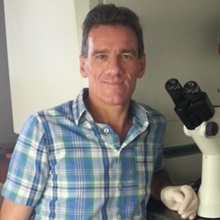Numerous hormone levels are deficient in PWS. However, the underlying biology and how the altered hormone levels contribute to the characteristics of PWS is not well understood. Dr. Nicholls’ group has developed a novel cell culture model system to study how PWS genes regulate hormone production and release. This model system will advance our understanding of PWS at the cellular level, and may provide a platform that can be used for high throughput screening of small molecule therapies for PWS.
ABSTRACT: Hormones released from hormone-producing (endocrine) glands in the body provide a chemical communication system to help control many aspects of life, including development, growth, puberty, reproduction, and contribute to metabolism including when (hunger) and how much (satiety) we eat as well as the control of blood sugar levels. All of these body systems are affected by the genetic deficits in PWS, with reductions in the release of many of these hormones from the brain’s hypothalamus and pituitary (hormones that control growth and reproduction) and from the pancreas (insulin and glucagon). For example, the most effective therapeutic intervention for PWS has been growth hormone (GH)-treatment beginning in infancy, leading to improvements in muscle function, body composition, height, and the overall clinical outcome in PWS. Nevertheless, GH treatment is not a cure and many clinical issues remain including hyperphagia (constant desire to eat), episodes of low blood sugar (hypoglycemia) and behavioral problems. Previously, using a PWS mouse model, we found abnormalities in hormone-producing cells in the pancreas with deficits in how these cells release insulin and glucagon. We propose that numerous hormone deficits occur in PWS and that understanding the underlying basis will allow additional hormone or small molecule therapies to be identified for clinical features not helped by GH-treatment.
We have developed a cell culture model system to study how PWS genes regulate hormone production. Using endocrine cells that specifically release insulin or glucagon (and in the future we will study brain endocrine cells that produce other hormones that are deficient in PWS), we have used “genome editing” tools to successfully produce cell lines that have the PWS-chromosome deletion for comparison to genetically-identical cells without the PWS-deletion. Our first aim is to use these tools to produce sets of PWS and control insulin- and glucagon-producing cells (multiple PWS and control lines are needed for statistical comparisons). Our second aim is to demonstrate deficits in hormone release from PWS endocrine cells and to use whole cell gene expression tools to identify which subset of all genes are the ones that the PWS gene products regulate and how disruption of these gene pathways leads to abnormalities in hormone release. Our third aim makes use of a fluorescent biomarker (which “glows” a cherry red color) that we engineered to traffic through the cell along with the native hormone, and will allow us to identify how and where the hormone is stuck inside the cell machinery of PWS cells. Combined, the proposed studies will lead to an understanding of how hormone production goes wrong in PWS endocrine cells and which PWS genes are responsible. The studies will also produce functional PWS cell models that will allow future screening for additional hormone or small molecule therapies for PWS.
Learn more about the importance of growth hormone therapy for PWS.
Research Outcomes: Publications
Insulin secretion deficits in a Prader-Willi syndrome β-cell model are associated with a concerted downregulation of multiple endoplasmic reticulum chaperones. Koppes EA, Johnson MA, Moresco JJ, Luppi P, Lewis DW, Stolz DB, Diedrich JK, Yates JR, Wek RC, Watkins SC, Gollin SM, Park HJ, Drain P, Nicholls RD (2013). PLoS Genet 19(4): e1010710. https://doi.org/10.1371/journal.pgen.1010710.
Funded Year:
2016
Awarded to:
Robert Nicholls, PhD
Amount:
$108,000
Institution:
University of Pittsburgh Medical Center
Researcher:





